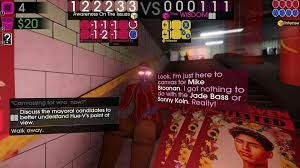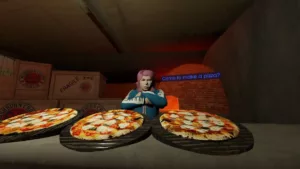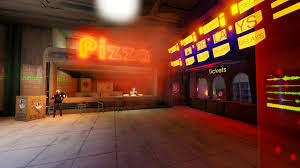This article describes the author’s experience with “Big Brother,” a recently discovered demo of a 1999 unreleased video game intended as a sequel to Orwell’s novel 1984. The game appears to be extremely difficult to run on modern systems, requiring multiple software installations and file modifications.
The author expresses nostalgia for the “awkward adolescent phase” of late 90s/early 2000s gaming when developers were ambitious but still figuring out the medium’s possibilities. This led to unusual creative choices like adapting a dystopian novel into a puzzle-solving adventure game.
Key points about the game:
- It’s a Myst-like puzzle game rather than an action game, despite having an action-movie-style plot
- The plot involves a rebellion and rescuing your fiancée, which diverges significantly from Orwell’s original work
- The game contains numerous technical issues, including swift movement speed and invisible obstacles that cause instant death.
- Visual elements include propagandistic slogans from the book and CCTV feeds of empty prison cells.
The author concludes that while “Big Brother” isn’t a good game (which likely explains why it was never officially released), it represents an interesting artifact from gaming’s developmental period, when developers took creative risks and players had to develop intimate knowledge of their games through troubleshooting and file manipulation.
Review: Big Brother (1999 Unreleased Demo)
Big Brother is a fascinating technological relic that serves better as a museum piece than an actual game. This never-released demo from 1999 attempts the ambitious task of creating a sequel to George Orwell’s seminal novel 1984 but stumbles in nearly every aspect of execution.
Concept & Story: 4/10
The game abandons the thematic complexity of Orwell’s original work in favor of a generic “rescue mission” plot that feels jarringly out of place. Rather than exploring the psychological and philosophical elements that made 1984 so powerful, Big Brother transforms the setting into a backdrop for puzzles involving water pressure and elevator timing. The rebellion storyline and fiancée rescue mission have more in common with Die Hard than with Orwell’s bleak commentary on totalitarianism.
Gameplay: 2/10
As a Myst-inspired puzzle game, Big Brother fails to deliver coherent or enjoyable challenges. Puzzles range from the inscrutable (the shower water pressure system) to the physically impossible (reaching an elevator before it rockets upward while the character moves at uncontrollable speeds). Invisible death triggers scattered throughout levels add frustration rather than challenge, with each failure resulting in a “You have been re-educated” game-over screen.
Technical Performance: 1/10
The game is almost actively hostile to being played on modern systems. Installation requires multiple obsolete software packages, manual file manipulation, and DLL replacements. Even when successfully launched, the game suffers from severe speed issues that render normal movement nearly impossible, with the character moving at “Doom-guy speeds” that make precise navigation a nightmare.
Visuals & Atmosphere: 3/10
The visuals lack subtlety or artistic merit, with environments described as “wide and empty.” The game’s attempt to evoke the novel’s dystopian setting relies on heavy-handed imagery like enormous posters displaying the book’s famous slogans (“WAR IS PEACE,” “FREEDOM IS SLAVERY”) and repetitive animations of Big Brother rotating his head “like some kind of territorial owl.” CCTV feeds showing empty prison cells represent one of the few atmospheric touches that actually connect to the source material.
Historical Value: 8/10
Despite its numerous flaws, Big Brother has significant value as an artifact from gaming’s experimental adolescence. It represents an era when developers were still defining what video games could be, taking ambitious swings at adapting serious literature before the medium had fully matured. The game’s technical quirks also provide a window into gaming’s past, when players had to develop intimate knowledge of their games through troubleshooting and file manipulation.
Verdict: 3/10
Big Brother is not recommendable as a gaming experience, but it deserves recognition as a fascinating time capsule from an era when video games were still finding their identity. Its ambition exceeds its execution by a considerable margin, but that very mismatch makes it a perfect encapsulation of gaming’s awkward adolescence in the late 1990
Moves of the Diamond Hand
When Alex first launched the demo for Moves of the Diamond Hand, he carefully crafted a character focused on “Observation” and “Wit.” These seemed like the ideal skills for a game he perceived as a talkative, investigative RPG. He imagined himself expertly navigating conversations and uncovering hidden truths with ease.

In contrast, “Cooking” appeared to be a throwaway skill, reminiscent of Deus Ex’s infamous swimming ability. Alex was sure that investing in it would lead to nothing but regret. However, as fate would have it, the very first challenge he encountered presented an unexpected cooking option to bypass the obstacle entirely.
To his surprise, the culinary path seemed not only viable but potentially overpowered within this adventure game-RPG hybrid. Realising the potential of this overlooked skill, Alex knew it was time to reconsider his strategy. Determined to explore this newfound advantage, he decided to re-roll his character and embrace the way of the chef.

“Moves of the Diamond Hand” marks the latest creation from Cosmo D, an independent developer and talented musician whose previous work, “Betrayal at Club Low,” gained notable attention in 2022. Known for crafting unique and immersive experiences, Cosmo D has developed a reputation among indie gaming enthusiasts for his distinctive approach. While “Club Low” was a title that captured the imagination of hardcore indie game fans, “Diamond Hand” has quickly become a must-play, especially after its demo left a lasting impression.
This new title stands out as a combat-free RPG where players dive into a world rich with exploration, dialogue, and skill checks. Reminiscent of beloved games like “Disco Elysium,” “Planescape Torment,” and the non-combat elements of “New Vegas” and “Baldur’s Gate 3,” it offers an experience focused on narrative and player choice. The absence of combat encourages players to engage deeply with the story and characters, making every decision impactful.

Cosmo D’s creative prowess shines through in this game, blending his musical talent with storytelling to create a vibrant and immersive universe. Players find themselves captivated by the intricate world-building and compelling narrative that only an artist like Cosmo D can provide. It’s no wonder that “Moves of the Diamond Hand” quickly found its place on many gamers’ wish lists, prompting immediate purchases during seasonal sales.

With its availability on platforms like the Steam Deck, this game is accessible to a broad audience eager to explore its depths. As Cosmo D continues to innovate, fans eagerly anticipate what other surprises he might have in store for the future. His latest offering solidifies his status as a visionary in the indie gaming scene, cooking up experiences that resonate with players long after the credits roll.
Diamond Hand’s gritty, first-person perspective and punk, urban nightlife setting evoked memories of “Vampire: The Masquerade—Bloodlines,” a game that had long captivated the player’s imagination. In Diamond Hand, character progression, gear acquisition, consumables, and the outcomes of side quests were intricately tied to the modification of d6 skill rolls. This mechanic encouraged players to specialise, but not excessively, as the game’s challenges could often be tackled using a variety of skills, though rarely all at once.

The player invested in two primary skills and two secondary ones, creating a balanced approach that allowed for flexibility in overcoming obstacles. This strategy was essential, as success in other areas of the game could often mitigate the difficulty of a skill check. Completing a quest might provide an alternative path around a formidable roll, or it might enable the player to leverage one of their more potent abilities to eke out success with a less-developed skill.
In this way, Diamond Hand offered a dynamic and engaging experience reminiscent of the RPG classic that had once consumed so many hours. The player’s journey through the game’s underworld was marked by strategic decision-making and a sense of immersion in its vibrant, rebellious atmosphere.
In a world where culinary expertise held unexpected power, our protagonist found themselves uniquely equipped to charm numerous non-playable characters with their extensive knowledge of preferred beverages. This talent granted them invaluable perks in areas where they were lacking, specifically in “Wisdom” or “Physique,” enhancing their performance in subsequent challenges.
This setup offered an intriguing experience that sparked my curiosity about experimenting with different character builds. Despite this, certain quests or choices never felt utterly inaccessible. The game maintained its replayability without leaving the player feeling excluded from particular paths due to their character’s limitations.
However, hints from early dialogues suggested that the whole game might introduce exclusive storylines tied to individual skills, reminiscent of class-specific quests in classic RPGs like the Thieves’ Guild in the original Baldur’s Gate or the unique guilds found in the Elder Scrolls series. For a cooking aficionado, the ultimate objective was to craft the perfect sandwich.

As they awaited the entire game, the culinary path offered a delightful diversion through a pizza-crafting minigame. Here, discarded toppings became key ingredients for creating pies that enhanced dice rolls. Basil emerged as a favoured addition, providing the ability to swap dice rolls with opponents. This allowed for cunning tactics where the protagonist could purposefully fail a challenging roll using a weaker skill, only to mischievously exchange their poor result with the opponent’s superior one, much like a clever trickster turning the tables.
In a bustling city where culinary experiments knew no bounds, there existed a peculiar pizza known as the “oops, all basil” creation. While its flavour remained a mystery to many, its craftsmanship was beyond reproach. Meanwhile, in the heart of a bustling demo, numerous non-playable characters roamed, ripe for pickpocketing through the art of Deception. The anticipation built around whether other skills would receive similar enhancements, akin to the intricate pickpocketing and pizza chef minigames.

Among the demo’s most commendable features was the absence of any desire to engage in save scumming. The array of mitigation tools, the ability to retry most challenges, and the sometimes intriguing outcomes of failures made persevering far more appealing than compulsively reloading—a sentiment not even shared with beloved games like Disco Elysium or Baldur’s Gate 3. This exemplary RPG experience reached its peak not during the climactic dialogue boss battle against an AI-enhanced Big Mouth Billy Bass—a memorable encounter indeed—but in a different dialogue challenge that rivalled Sephiroth facing off against Emerald Weapon.
The Ultimate Challenge

Players could step into the shoes of a renowned street performer, captivating her adoring audience with a unique mini roguelike, repeatable dialogue puzzle adventure. To captivate the crowd and complete this sequence, players faced increasingly difficult skill checks, drawing upon their entire arsenal of talents—not just the specific “Music” skill. Failing three checks would mean forfeiting all accumulated tips.
Strategically, each skill could only be used once until all were exhausted, resetting the repertoire. This required careful deployment of weaker skills and consumables or even intentionally failing a few checks to lower difficulty modifiers and successfully finish the performance. Players could also choose to walk away with their earnings, investing in better equipment for an ultimate run.

The Pinnacle of Perfection
In the realm of gaming, 2025 promises a host of new titles on the horizon. Meanwhile, timeless classics continue to captivate players, and a treasure trove of free PC games awaits discovery for those seeking top-notch gunplay. The finest FPS games beckon, while grand adventures await in the best RPGs. Cooperative experiences shine in titles that truly excel when played together.
Diamond Hand stands out with its masterfully crafted skill checks, reminiscent of the intricate loops seen in Balatro. Beneath its captivating, adventure-driven surface lies an RPG with mechanical brilliance, distinguishing it from the plethora of visually stunning adventure games available on Steam.
Yet Diamond Hand is not just about its mechanics; it is also a visual masterpiece. Cosmo D’s Off-Peak City’s backdrop ties these games together with an “Adult Swim noir” aesthetic—bold, surreal, chaotic, and undeniably punk. Despite its eccentricity, the game maintains a warm and empathetic undertone. The narrative remains accessible, rooted in a commitment to Off-Peak’s fictional principles and politics, sparking curiosity about its world.
Naturally intrigued, the narrator purchased Club Low for a modest sum and installed it on their Steam Deck. Although lacking official verification or even a “playable” tag, it reportedly performs well on Valve’s handheld device.

The Diamond Hand demo presents a unique challenge. When tested on the Deck, it ran smoothly but struggled with input recognition, confusing the device’s buttons as either part of a gamepad or a mouse and keyboard setup.
While not a significant setback, playing Diamond Hand on the Deck demands more user adjustment than the narrator could manage during a busy workday or requires intervention from Cosmo D. Until then, it’s best suited for desktop play.
Regardless of the platform, the narrator remains committed. Completing the first chapter of the Diamond Hand demo took three hours—a prelude to three more chapters planned for release. The second chapter is anticipated as part of this year’s early access launch. Its standalone sandbox design makes it perfect for episodic enjoyment, enhancing the overall experience.
Secure browsing
When it comes to staying safe online, using a secure and private browser is crucial. Such a browser can help protect your personal information and keep you safe from cyber threats. One option that offers these features is the Maxthon Browser, which is available for free. It comes with built-in Adblock and anti-tracking software to enhance your browsing privacy.

Maxthon Browser is dedicated to providing a secure and private browsing experience for its users. With a strong focus on privacy and security, Maxthon employs strict measures to safeguard user data and online activities from potential threats. The browser utilises advanced encryption protocols to ensure that user information remains protected during internet sessions.
In addition, Maxthon implements features such as ad blockers, anti-tracking tools, and incognito mode to enhance users’ privacy. By blocking unwanted ads and preventing tracking, the browser helps maintain a secure environment for online activities. Furthermore, incognito mode enables users to browse the web without leaving any trace of their history or activity on the device.
Maxthon’s commitment to prioritising the privacy and security of its users is exemplified through regular updates and security enhancements. These updates are designed to address emerging vulnerabilities and ensure that the browser maintains its reputation as a safe and reliable option for those seeking a private browsing experience. Overall, Maxthon Browser offers a comprehensive set of tools and features aimed at delivering a secure and private browsing experience.
Maxthon Browser, a free web browser, offers users a secure and private browsing experience with its built-in Adblock and anti-tracking software. These features help to protect users from intrusive ads and prevent websites from tracking their online activities. The browser’s Adblock functionality blocks annoying pop-ups and banners, allowing for an uninterrupted browsing session. Additionally, the anti-tracking software safeguards user privacy by preventing websites from collecting personal data without consent.
By utilising Maxthon Browser, users can browse the internet confidently, knowing that their online activities are shielded from prying eyes. The integrated security features alleviate concerns about potential privacy breaches and ensure a safer browsing environment. Furthermore, the browser’s user-friendly interface makes it easy for individuals to customise their privacy settings according to their preferences.
Maxthon Browser not only delivers a seamless browsing experience but also prioritises the privacy and security of its users through its efficient ad-blocking and anti-tracking capabilities. With these protective measures in place, users can enjoy the internet while feeling reassured about their online privacy.
In addition, the desktop version of Maxthon Browser works seamlessly with their VPN, providing an extra layer of security. By using this browser, you can minimise the risk of encountering online threats and enjoy a safer internet experience. With its combination of security features, Maxthon Browser aims to provide users with peace of mind while they browse.
Maxthon Browser stands out as a reliable choice for users who prioritise privacy and security. With its robust encryption measures and extensive privacy settings, it offers a secure browsing experience that gives users peace of mind. The browser’s commitment to protecting user data and preventing unauthorised access sets it apart in the competitive web browser market.
